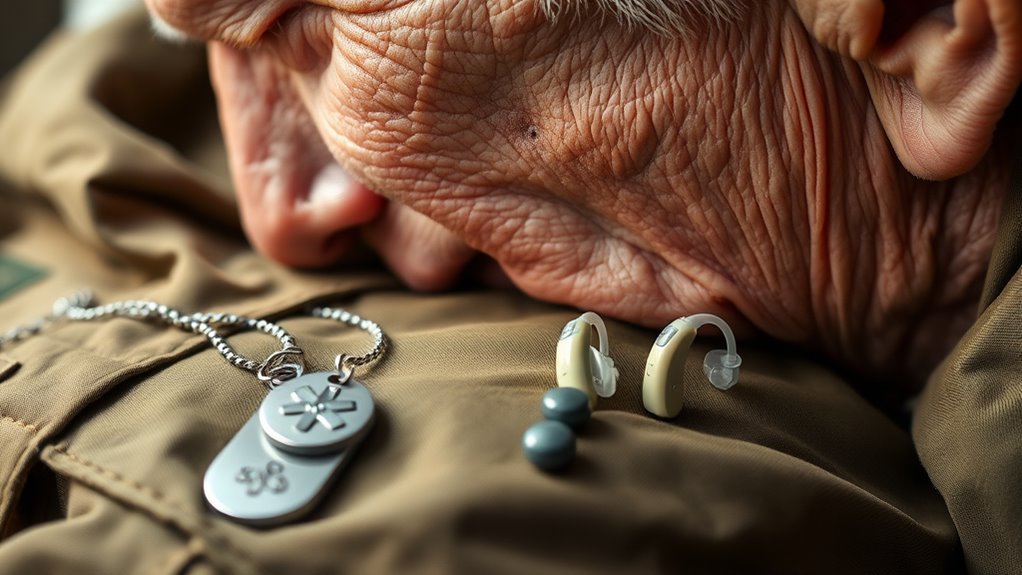To prove your tinnitus is service-connected, you need to show your exposure to loud noises during military service caused your symptoms. Gather service records documenting noise exposure, deployment history, and medical records indicating tinnitus onset. Statements from fellow service members or supervisors can help reinforce your claim. Providing detailed evidence linking your tinnitus to military noise exposure strengthens your case. Keep in mind, understanding how to establish this connection is essential—continue to explore ways to support your claim effectively.
Key Takeaways
- Document military noise exposure through service records, deployment history, or occupational duties involving loud equipment.
- Obtain medical records showing tinnitus onset and its progression during or after service.
- Gather witness statements from fellow service members or supervisors confirming noise exposure.
- Clearly establish a link between tinnitus symptoms and specific military noise incidents.
- Consult with healthcare professionals and VA specialists to support the claim with proper documentation.

If you’ve served in the military and experience persistent ringing or buzzing in your ears, you may have service-connected tinnitus. Many service members face this condition due to military noise exposure, which occurs during training exercises, combat, or operating loud equipment. Establishing a clear link between your tinnitus and your military service is essential for securing VA benefits and accessing appropriate treatment options. The VA recognizes military noise exposure as a common cause of tinnitus, but you’ll need to prove that your condition is connected to your service to qualify for benefits.
To do this, you should gather evidence showing your exposure to loud noises during your military career. This includes service records, deployment history, and documentation of occupational duties involving loud equipment or weapons. Medical records that detail your tinnitus symptoms and any prior diagnoses can strengthen your claim. Statements from fellow service members or supervisors who observed your hearing issues can also help establish the link. The more detailed your evidence, the better your chances of proving that your tinnitus is service-connected. Additionally, understanding the recommended formulations for protecting delicate skin can be useful if you seek to manage related health issues.
Understanding tinnitus treatment options is also *essential* once your claim is accepted. While there’s no cure for tinnitus, various treatments can help manage its symptoms. Many veterans find relief through hearing aids equipped with masking features, which drown out the ringing sounds. Sound therapy, using white noise or specialized devices, can also make tinnitus less noticeable. Cognitive-behavioral therapy (CBT) is *effective* for addressing the emotional and psychological impact, helping you develop coping strategies. In some cases, medication may be prescribed to alleviate associated anxiety or depression but won’t directly treat tinnitus itself.
It’s important to consult with healthcare professionals experienced in tinnitus management, as they can recommend personalized treatment plans. The VA offers *extensive* tinnitus evaluation and treatment services, including audiology assessments and counseling. Making sure your tinnitus is properly documented and treated can *considerably* improve your quality of life. Remember, establishing your service connection is just the first step; ongoing treatment and management are equally *crucial*.
Frequently Asked Questions
Can Tinnitus Be Caused by Non-Military Noise Exposure?
You might wonder if tinnitus can result from non-military noise exposure. It definitely can, especially if you’ve faced occupational hazards or environmental noise like loud machinery or concerts. Prolonged exposure to such sounds can damage your hearing and cause tinnitus. To establish a service connection, you’ll need to show a link between your noise exposure outside of military service and your tinnitus symptoms.
How Long After Exposure Can Tinnitus Develop?
After noise exposure, your tinnitus can develop immediately or within hours, depending on your sensitivity. In some cases, symptom onset occurs right away, while for others, it might take days. Factors like duration and intensity of noise exposure influence how quickly tinnitus appears. Keep in mind that even delayed symptom onset still links to the original noise exposure, so noting when you notice symptoms is vital for understanding its cause.
Are There Specific Military Roles With Higher Tinnitus Risk?
Certain military roles have higher tinnitus risks due to military occupational hazards. If you serve in noisy environments like artillery, aviation, or infantry, your risk of service member noise exposure increases. These roles often involve loud equipment and weapons, which can lead to tinnitus. If you experience ringing or buzzing after such exposure, it’s important to document it, as these roles are linked to greater chances of developing tinnitus.
What Are Common Misdiagnoses Related to Tinnitus?
Did you know that tinnitus is often misdiagnosed in up to 30% of cases? You might face misdiagnosis challenges due to symptom overlap with conditions like ear infections, hearing loss, or even neurological issues. These challenges can delay proper treatment, making it vital to distinguish tinnitus accurately. Always consult a specialist who can carefully evaluate your symptoms to avoid common misdiagnoses and guarantee you receive the right care.
Does Tinnitus Qualify for Other VA Disability Benefits?
When considering VA disability claims, tinnitus can qualify for benefits if it’s service-connected. You may be eligible for disability compensation, depending on the severity and impact on your daily life. While tinnitus treatment involves managing symptoms, proving the link to your service fortifies your claim. Guarantee you gather relevant medical records and documentation to support your case, making the process smoother when submitting VA disability claims for tinnitus.
Conclusion
Understanding how to prove your tinnitus is service-connected can feel overwhelming, but you’re not alone. Did you know that nearly 60% of veterans with tinnitus also report hearing loss? This statistic highlights how common and connected these issues are. By gathering solid evidence and medical opinions, you can strengthen your claim and get the support you deserve. Stay persistent, and remember, proving the link is a crucial step toward securing your benefits.










